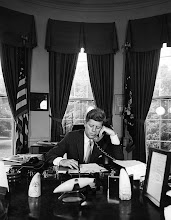I listened to Richard Nixon's Bombing for Peace Callings. These were a variety of conversations over the issue of the Vietnam War. The first three conversations (with Melvin Laird, Ken Rush, and Thomas Moorer) was simply a discussion of Nixon's new war decision: to mine the Hanoi and Haiphong Harbors. Before these conversations, he gave a speech to the public discussing the rationale of this wartime development. The first three people all agreed with Nixon in his new plans and zeal to be more aggressive with the Vietnam War. Melvin Laird was the Defense Secretary and was told by Nixon to be more "hawkish" even more than Nixon himself. Laird simply agreed to everything Nixon said and promised his support. Ken Rush was the Ambassador to Germany who also agreed with Nixon's speech. Nixon told Rush how to specifically word his defense on the mining and counter-offensive efforts. Thomas Moorer was the Chairman of the Joint Chiefs of Staff. Nixon simply stressed that the bombings be executed flawlessly and that there is no excuse that it shouldn't be executed perfectly. Through these first three calls Nixon's zeal in the Vietnam War was displayed, as he kept pushing everyone to get the public on his side and to the success of the counter-offensive. Additionally, he kept interrupting these three people when they were on the phone. This displayed how he always got quick to business and further supports his zeal in the war.
The morning after these calls (and after his speech), he talked to Attorney General John Mitchell about the public reaction to his speech. Mitchell discussed how there was a resounding agreement from the public in Nixon's speech and reaction. He then discussed getting the support of other men.
A week later, Nixon talked with national security affairs advisor Alexander Haig about propaganda. Nixon simply asked what everyone was doing in the regard of scaring the enemy through bluffing. He talked about how it isn't the time for truth because this is war. Nixon discussed how the propaganda side of this war effort has been very weak and therefore needs to be used since the tide of war might be turning.
His conversations all displayed the need to manipulate the throng of people through language and positions. He worried about the public opinion and how to specifically word the counter-offensive to win public opinion and wanted more focus on propaganda. These all display his political, manipulative tactics so that the war effort may be strengthened and continued, displaying his power in manipulation through political language. The entire conversations were interesting to listen to as it displayed that the Presidents talk just as normal people do and allowed me to try to understand Nixon and his behavior, even after all these years.
Welcome APUSH'ers
Hello AP US History Students of the Summer 2014e,
Many of you are aware that something happened to the blog and posting was disabled. I only just was able to correct the problems with Google this weekend. I have a How to to help those who haven't posted anything, or just need to submit your final comment. Please do so as soon as you can. Deadlines will be extended to Tuesday, August 19th at 10 pm for all the Summer Blog deadlines.
You can access the Help Sheet by Clicking Here.
You need to post comments three different times for your Summer Reading.
Every time you post, you must include your first and last name-- every time you post (get the idea that your name is important?). Without a name, grades cannot be assigned. Keep in mind that we do not know you by name other than from the legal roster, please put any given names not used in parenthesis).
It is IMPORTANT that you use the username and password included in your Summer Reading packet. (username: mcapush2 password: historyrules)
Many of you are aware that something happened to the blog and posting was disabled. I only just was able to correct the problems with Google this weekend. I have a How to to help those who haven't posted anything, or just need to submit your final comment. Please do so as soon as you can. Deadlines will be extended to Tuesday, August 19th at 10 pm for all the Summer Blog deadlines.
You can access the Help Sheet by Clicking Here.
You need to post comments three different times for your Summer Reading.
Every time you post, you must include your first and last name-- every time you post (get the idea that your name is important?). Without a name, grades cannot be assigned. Keep in mind that we do not know you by name other than from the legal roster, please put any given names not used in parenthesis).
It is IMPORTANT that you use the username and password included in your Summer Reading packet. (username: mcapush2 password: historyrules)
Subscribe to:
Post Comments (Atom)




No comments:
Post a Comment